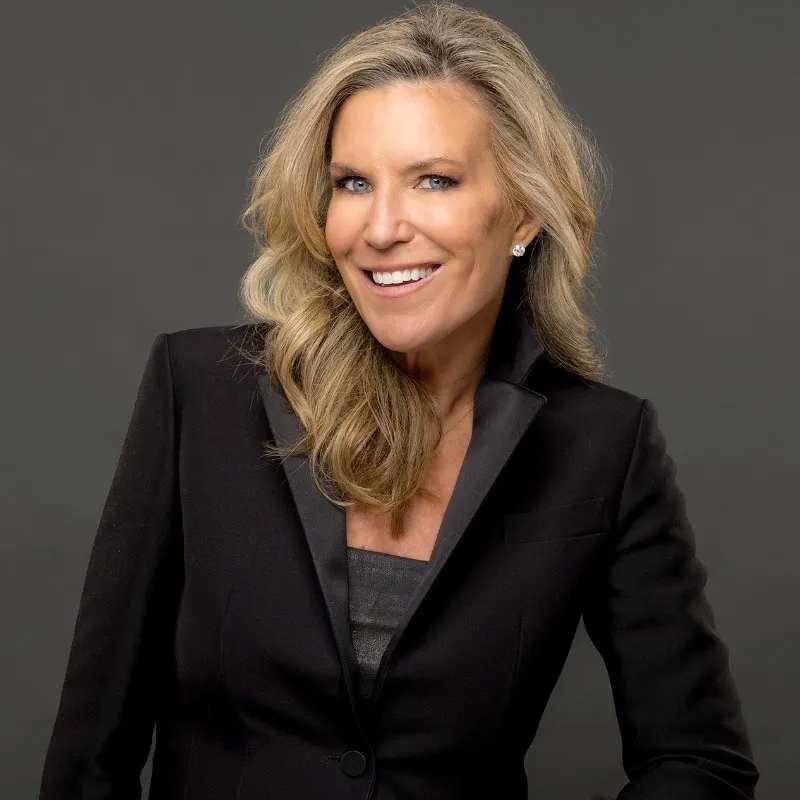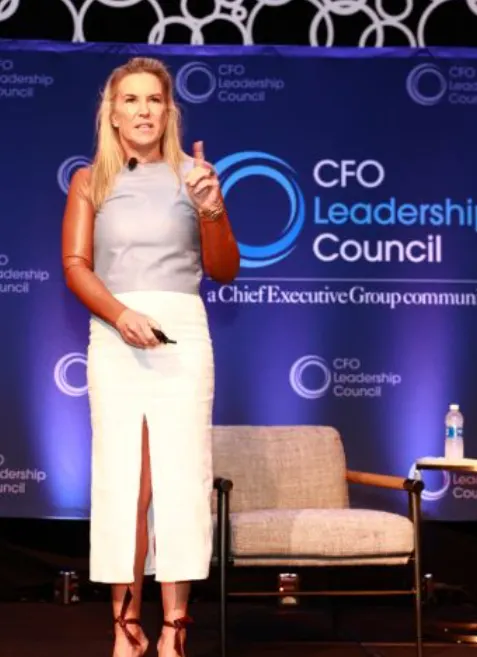Jennifer Langton has built a career leading through transformation, from her early days at Atari to her years in the NFL’s front office.
Now, after building a career around her ability to connect financial strategy with people and purpose, she’s a frequent speaker on leadership and change, and is exploring opportunities where her operational mindset can drive impact at the COO level.
In this conversation with CFO.com, Langton reflects on lessons learned from both her CFO and non-CFO experience leading across industries, the value of authentic connection in times of uncertainty and how finance leaders can turn trust, collaboration and data optimization into tangible business results.
Jennifer Langton

Fractional COO and keynote speaker
Notable previous positions:
- Senior vice president of player health and innovation, National Football League
- CFO, Atari North America
- Manager, CBS Broadcasting
This interview took place at the CFO Leadership Council’s Fall Conference in Austin, Texas, on Oct. 8th, 2025. It has been edited for brevity and clarity.
ADAM ZAKI: You’ve led across several industries that have had their own versions of change, transformation and uncertainty. During those times, how did you lead through it?
JENNIFER LANGTON: Having both a finance and athletic background really set me up to lead transformation. In many of my roles, I’ve been the change agent. My core ability is to build authentic connections and bring people onto the team.
When I said [in my keynote speech] ‘connect, trust, grow [is] my operating model’, it starts with authentic connection. If you don’t connect with people, they won’t respect you enough to follow your lead. That connection is first.
It’s a lot of one-on-one time with key stakeholders, and that’s what builds trust. When they see how you show up, they start trusting you. Once they trust you, they trust one another. That’s what creates wins in uncertain situations.
At Atari, when I led change in finance, or at the NFL during the concussion crisis, the principle was the same. The scale might have changed, but the model didn’t. Authentic connection builds trust, and trust drives performance.
You also have to address behaviors that resist change early. Those who struggle to adopt new ways can slow everything down. If you sit with them, listen and ask the right questions, you can get to the root of their fear of change. When they start to believe in you, they’ll believe in the process and in the team.
What advice would you give to a CFO who’s stepping into a new company with a lot of ideas and change initiative but finds themselves in a culture that’s set in its ways?
If you come in too bold, you’ll create resistance. When you’re starting a new job, authenticity matters.
The question makes me think back to when I joined the NFL. They were about to send out an apparel bid, and I was thinking about how to improve that process from a finance perspective. Major, well-known brands were bidding to be on the field.
I had built financial websites and dashboards for executives at Atari and Viacom, but I didn’t come in saying, ‘This is what I want to do.’ Even though I’m a natural change agent, I knew it had to happen in phases and through processes.
So first, I went to the executive vice president. I didn’t say, ‘This is what I’m going to do.’ I proposed building a digital bidding platform, based on my experience, to make the process easier for him and his team. That approach set me up for success.

It’s important that leadership controls the pace at which conversations around change happen. At the NFL, I had a lot to learn at first. I had to understand the apparel business and licensing model. I learned then the importance of not getting ahead of yourself.
If you take the time to learn properly, you’ll find out who your allies in the business are, who might resist change and how the organization really works. That’s how you start to build your mark. But you have to engage and build it with them.
How do you get finance to collaborate with other parts of the business, like marketing or operations, in a way that drives results instead of just relationships?
Data is a huge part of breaking down silos, and the CFO’s role in making this happen is critical.
When I came into Atari, we went through change. At that time, sales, marketing and [research and development] were all operating separately. When I built their financial system, I could, based on a title and a SKU, consolidate the financials and see what each department contributed.
They had never done that before. It was a perfect example of how to bring people together. For a title about to be released, we could now see there was no profitability.
So we’d bring everyone together and ask, ‘Where are we? What needs to change?’ Sometimes those conversations wouldn’t have happened otherwise. But if you do the financial diligence — really understand the numbers and the business — you can use that information to unite the team. Data gives people a common language, and that’s what moves collaboration forward.
CFOs often debate how perfect data needs to be. Some say they need 98% accuracy before making a big change, while others are fine moving forward with what they have for the sake of growth. Where do you stand?
There are many companies that haven’t invested in their infrastructure, data or analytics. This is where a good CFO comes in and plays a big part. Part of the CFO’s job at most organizations now needs to be setting new governance for how data is managed and used.
In my last role at the NFL, the data had to be accurate. There, precision wasn’t just important — it was essential. We measured movements down to the smallest detail and required their scientific significance to be proven by robust data. Every project hinged on that level of rigor, because players’ health and safety were at stake.
So, it depends on the context. For something like player safety, it has to be 100% accurate. But in other businesses, an 80/20 rule can apply. To move operations forward, not everything needs to be perfect. Sometimes you start with what you have and improve the data as you go. The key is knowing when accuracy is critical and when progress is more important.
You’ve talked about turning wins into repeatable solutions. How do you keep a team motivated after hitting a big milestone, like an IPO, when there’s still a lot of work to do afterward?
That’s an easy one for me, because it’s my operating model and how I have built my leadership style.
“It’s not just about celebrating the big wins. It’s about honing in on your team, reestablishing your goals and keeping everyone aligned around the next mission.”

Jennifer Langton
Fractional COO and keynote speaker
If you connect and get the right stakeholders in a room to define what you’re solving for and how, you can then use data and trust to get to the right conclusions. Once you’ve done that, the process can scale or not scale, but you’ve built the foundation. There’s always a next mission. In tech, they call them sprints.
With IPOs, it’s the same. There are different pressures and stresses that come afterward, and those should be planned for, too. It’s not always about the win itself. When implementing new technology in finance as a CFO, you often have projects that don’t prove out the way you expect, but there’s learning in that. Understanding the why and why not helps you accelerate forward.
It’s not just about celebrating the big wins. It’s about honing in on your team, reestablishing your goals and keeping everyone aligned around the next mission.
Public speaking is becoming more important and of interest to CFOs, but it’s not something most are trained for. How did you learn to prepare and speak with confidence?
Practice, practice, practice. Even if you think you know your material, you still need to rehearse.
A lot of my speaking centers around my personal story — how authenticity helped me overcome adversity. Only I know that story, so I have to deliver it in a way that feels true to me. You learn over time that your audience doesn’t know what you know, so it’s your story to tell.
One of the best pieces of advice I ever got was from a gentleman at the NFL. Every time he got up on stage, he brought so much energy. I asked him, ‘How do you do that?’ He said, ‘I never look at the slides. I look out and connect with the audience.’
He would always start by including the audience — ‘Good morning!’ — and make it conversational. That broke his tension and helped him connect immediately. People can feel your nerves, so if you can connect in that first moment, it calms everyone down.
From my finance background, two things helped me a lot. First, I had someone on my team whom I’d make present to me before she presented anywhere else. When you coach others like that, you start critiquing yourself naturally.
Second, I’d shadow great presenters. My boss at the NFL was a lobbyist and attorney, and he was brilliant. I’d give him data and a subset of information, and he’d turn it into the most powerful elevator pitch. Watching him helped me understand how to distill complex ideas into something compelling.
And lastly, do your own slides. Your story has to be unique to you. Someone can give you a template, but you need to make it your own. For me, speaking feels like being an athlete again. It’s performance, but it’s also fun when you connect authentically.





